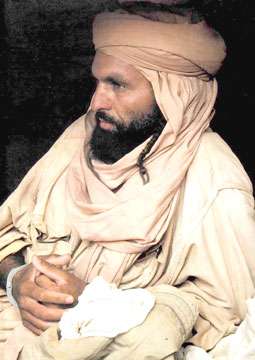3 page article in the International Herald Tribune. Here are the key bits:
The plan, hatched for months in the arid mountains of North Africa, was to attack the American and British embassies here. It ended in a series of gun battles in January that killed a dozen militants and left two Tunisian security officers dead.
But the most disturbing aspect of the violence in this normally placid, tourist-friendly country is that it came from across the border in Algeria, where an Islamic terrorist organization has vowed to unite radical Islamic groups across North Africa.
The group, the Salafist Group for Preaching and Combat, known by its French initials, GSPC, has for several years been under American watch.
"The GSPC has become a regional terrorist organization, recruiting and operating in all of your countries and beyond," Henry Crumpton said last year as the U.S. ambassador at large for counterterrorism.
I didn't know we had an ambassador at large for counterterrorism.
"It is forging links with terrorist groups in Morocco, Nigeria, Mauritania, Tunisia and elsewhere," he said at a counterterrorism conference in Algiers. Officials say the GSPC is funneling North African fighters to Iraq but is also turning militants back toward their home countries.
While most estimates put the group's current membership in the hundreds, it has survived more than a decade of Algerian government attempts to eradicate it. It is now the most organized, best financed terrorist group in the region. On September 11, 2006, Al Qaeda anointed the GSPC as its representative in North Africa. In January, the group reciprocated by changing its name to Al Qaeda Organization in the Islamic Maghreb, claiming that Al Qaeda leader, Osama bin Laden, had ordered the change.
The GSPC was created in 1998 as an offshoot from the Armed Islamic Group, or GIA, which fought a decade-long civil war after the Algerian military canceled elections in early 1992 because an Islamist party was poised to win. In 2003, a GSPC leader in southern Algeria kidnapped European tourists, some of whom were released for a ransom of 5 million, or about $6.5 million, paid by Germany.
Officials say the leader, Amari Saifi, bought weapons and recruited fighters before the U.S. military helped corner and catch him in 2004. He is now serving a life sentence in Algeria.
Since then, an even more radical leader, Abdelmalek Droukdel, has taken over the group. The Algerian military says he trained in the 1990s as a member of the GIA's Ahoual, or Horror, company, blamed for some of the most gruesome massacres of Algeria's civil war. He announced his arrival with a truck bomb at the country's most important electrical production facility in June 2004 and focused on associating the group with Al Qaeda.
Wiretaps, interrogation of terrorist suspects and recovered documents suggest that the network has associates in France, Italy, Turkey and even Greece, which is favored as an entry point to Europe because of its relatively lax immigration controls, according to counterterrorism officials.
Tunisian officials have sought to play down the GSPC link and have said the recently dismantled group's target was the West. In fact, said Samir Ben Amor, the Tunisian lawyer who defends many young Tunisian Islamists, more than 600 young Tunisian Islamists have been arrested in the last two years more than a hundred in the last two months trying to travel to Iraq to fight the United States.
Lots more meat at the link: operations both executed and planned, arrests, captured information (they're keen on Google Earth maps). |
 [MAGHAREBIA] An Algiers court on Tuesday (November 12th) sentenced four faceless myrmidons to 20 years in prison for their involvement in the kidnapping of 15 foreign tourists in 2003, APS reported.
[MAGHAREBIA] An Algiers court on Tuesday (November 12th) sentenced four faceless myrmidons to 20 years in prison for their involvement in the kidnapping of 15 foreign tourists in 2003, APS reported.
 Fewer than 100 Islamist rebels have surrendered under an Algerian amnesty and at least 700 remain at large fighting for a purist Islamic state, the interior minister said on Saturday.
Fewer than 100 Islamist rebels have surrendered under an Algerian amnesty and at least 700 remain at large fighting for a purist Islamic state, the interior minister said on Saturday. An Algerian army patrol clashed with members of an Islamic militant group allied with al-Qaeda in the desert of northern Mali last week, killing at least 12 people, a senior Malian defence official said on Tuesday. The gunfight involving members of the
An Algerian army patrol clashed with members of an Islamic militant group allied with al-Qaeda in the desert of northern Mali last week, killing at least 12 people, a senior Malian defence official said on Tuesday. The gunfight involving members of the  Algeria sought on Wednesday to squash speculation about the whereabouts of one of the country's top Islamic militants who is accused of having ties to al Qaeda, saying he was under interrogation.
Algeria sought on Wednesday to squash speculation about the whereabouts of one of the country's top Islamic militants who is accused of having ties to al Qaeda, saying he was under interrogation.